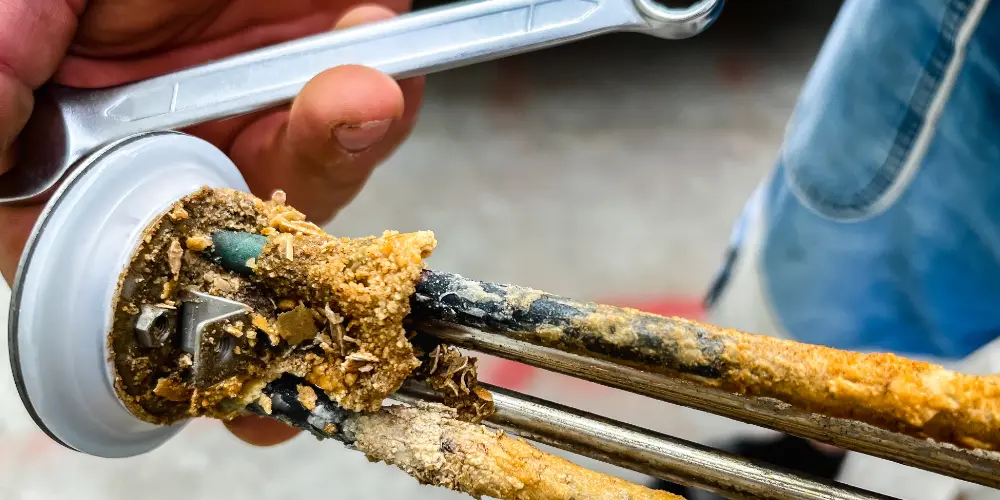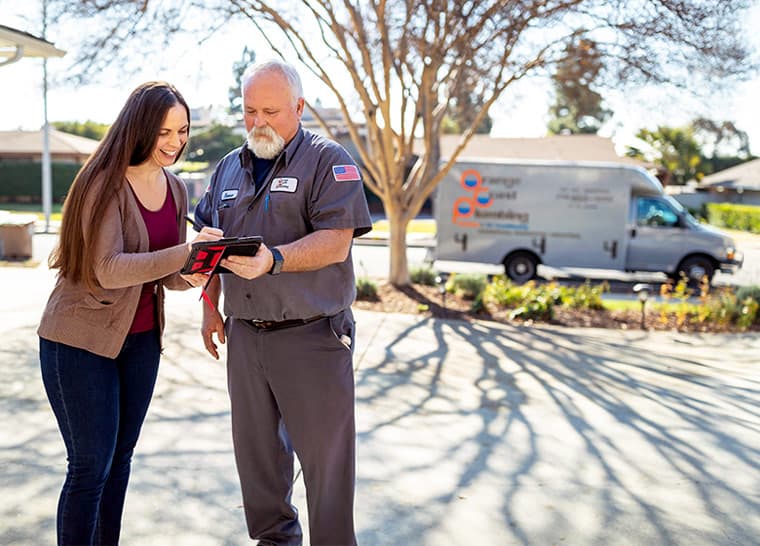Parting is such sweet sorrow.
You linger on the phone, not knowing how to end the conversation. You stay too long at the party and loiter over lunch as restaurant patrons pile up in the waiting area. It’s hard to say goodbye.
But when it comes to water heaters, a quick and clean goodbye is precisely what you need. Postposing action on a faulty heater can be dangerous to your health and home. Besides, wouldn’t you prefer a gentle, comfortable stream of water from the shower head instead of the El Niño fluctuations of hot and cold you’re experiencing?
Your water heater could be sending you signals — subtle or otherwise — that it’s approaching retirement age.
How Long Does a Water Heater Last?
Typical Lifespan
The lifespan of a water heater varies based on its type, use, and maintenance. Generally speaking:
- Tank water heaters last about 8 to 12 years.
- Modern, efficient tankless water heaters can last up to 20 years or more.
Factors Affecting Lifespan
- Hard water causes mineral buildup, reducing efficiency and lifespan.
- Higher use naturally wears out the heater faster.
- Regular maintenance can extend the life of your water heater significantly.
- Poor installation can damage the unit and decrease lifespan.
- Corrosive chemicals or harsh environments can also shorten the life of a water heater.
Signs It’s Time to Replace Your Water Heater
- Age: As mentioned, most traditional tank water heaters last about 8 to 12 years. If your water heater is approaching this age range, consider a replacement.
- Rusty or discolored water: This is a sign of corrosion within the tank, which means it’s likely time for a new one.
- Strange noises: Loud cracks, pops, or rumbling sounds from your water heater could indicate serious issues.
- Leaking: Leaks or puddles around your water heater should never be ignored. Leaks can quickly escalate into flooding.
- Inconsistent hot water: If you constantly adjust the temperature on your water heater and still experience inconsistent hot water, this could indicate a failing unit.
- Increased energy bills: As water heaters age, they use more energy and can spike your energy bills. Time to start shopping around.
- Reduced water supply: If you’re running out of hot water faster than usual, your water heater may be near the end.
- Frequent repairs: Old cars break down more often. The same holds for water heaters. Frequent repairs can eventually cost more than a new unit.
When to Repair vs. Replace
Minor Repairs
Play it safe here. For most minor repairs, call a licensed plumber, not some guy you found on Craigslist.
- Replacing the anode rod can prevent rusting and extend the lifespan of your water heater.
- Flushing the tank can remove sediment buildup and improve efficiency and longevity. In some cases, you can do this DIY.
- Replacing the thermostat is another relatively simple repair that can solve inconsistent water temperature issues.
- Tightening plumbing connections can prevent leaks.
- Installing insulation can reduce energy costs and save wear and tear on your water heater.
Replacement
Some repairs indicate it’s time to replace your water heater altogether. These include:
- A leaking tank is a major issue and typically requires replacement.
- Major corrosion or rusting can’t be undone. If you notice significant rust or corrosion, it’s time for a new water heater.
- Broken or damaged heating elements can sometimes be repaired, but it may be best to replace the entire unit if the damage is severe.
- Cracks in the tank are a definite signal to replace. Don’t risk potential flooding or further damage.
A general rule of thumb is that replacement is the better option when the repair cost exceeds 50% of the price of a new unit.
Choosing a New Water Heater
Types of Water Heaters
When it’s time to replace your water heater, you’ll have a few options to consider:
- Tank water heaters store a large volume of hot water and are ideal for households with higher hot water demands.
- Tankless water heaters provide hot water on demand and are more energy-efficient and durable. They can be installed almost anywhere, including outdoors, but need a dedicated electrical circuit for safe operation,
- Heat pump water heaters use electricity to transfer heat from the air or ground into the water. They cost more but save energy in the long run.
- Solar water heaters use the sun’s energy to heat water, making them the most energy-efficient option. However, they’re more expensive upfront and require proper installation for optimal performance.
Sizing
A unit that’s too small won’t provide enough hot water for your needs, while an oversized unit will waste energy and money.
- Calculate your household’s peak-hour demand: This is the maximum amount of hot water used in an hour. The average person uses about 10 gallons of hot water per day.
- Consider tank vs. tankless: Tankless heaters provide endless hot water but have a limited flow rate.
- Factor in your climate: Cold climates require larger tanks or higher-powered units to compensate for the colder groundwater temperature. Solar and heat pump heaters work best in warmer climates.
- Consult an expert: A licensed plumber can help you determine the right size and type of water heater for your household.
Other Considerations
- Energy efficiency: Look for water heaters with the Energy Star label, which indicates they meet strict energy efficiency guidelines set by the US Environmental Protection Agency. Energy-efficient models can reduce utility bills and lower environmental impact. Some Energy Star-rated units may qualify homeowners for federal or state tax credits.
- Cost: Consider both the upfront cost and long-term operating expenses. While tankless and solar water heaters have higher initial costs, they often offer significant energy savings over time.
- Installation costs: The installation cost can vary significantly based on the type of water heater and the complexity of the installation. Tankless units, for instance, may require additional plumbing or electrical work.
- Warranty: A more extended warranty period provides more protection and indicates the manufacturer’s confidence in the product’s durability.
- Space requirements: Ensure the water heater fits in the designated space. Tank water heaters require more space, while tankless models are more compact and flexible regarding installation location.
- Climate: Heat pump water heaters are more efficient in warmer climates, while solar water heaters need ample sunlight to be effective.
- Maintenance: Tankless water heaters need regular descaling, especially in areas with hard water, while traditional tank models may require periodic flushing to remove sediment.
- Hot water recovery rate: For households with high hot water demand, the recovery rate — how quickly the heater can reheat water — is critical. Higher recovery rates often mean better performance during peak use.
- Fuel source: Water heaters can be powered by electricity, natural gas, propane, or solar energy. Choose a fuel source that’s readily available, cost-effective, and compliant with local and state laws.
Installation & Maintenance
Professional Installation
Installing a water heater isn’t a DIY project for most homeowners. Professional installation ensures the unit is set up correctly and safely. Plus, many warranties require professional installation to remain valid.
Regular Maintenance
To get the most out of your new water heater, follow these tips:
- Flush the tank annually. This helps remove sediment buildup and keeps the heater running efficiently.
- Inspect and replace the anode rod as needed to prevent rusting.
- Inspect the pressure relief valve regularly and replace it every three years.
- Make regular checks for leaks or other to catch problems early.
FAQs: Replacing a Water Heater
Q: How do I know if my water heater is still under warranty?
Check the label on your water heater for the manufacturer’s information and the serial number. You can typically determine if your unit is still under warranty by contacting the manufacturer or checking their website.
Q: Can I switch from a tank water heater to a tankless model?
Yes, you can switch from a tank to a tankless water heater, but it may require additional modifications to your home’s plumbing and electrical systems. Consult with a professional to understand the scope and cost of transition.
Q: How often should I replace my water heater?
On average, tank water heaters should be replaced every 8 to 12 years, while tankless models can last up to 20 years. Look for signs of wear and inefficiency and replace them as needed.
Q: Are there any signs I can watch for to avoid a sudden water heater failure?
Monitoring the signs mentioned earlier — such as noisy operation, rusty water, leaks, inconsistent temperatures, and reduced hot water supply — can help you catch issues before they lead to a complete failure.
Q: What should I do if my water heater makes strange noises?
Strange noises such as rumbling, popping, or banging can indicate sediment buildup inside the tank. Flushing the tank can alleviate this issue. If the noises persist, contact a professional for a thorough inspection.
Q: How can I improve the energy efficiency of my water heater?
Insulating your water heater tank and pipes, lowering the thermostat setting to 120°F, and performing regular maintenance like flushing the tank and inspecting the anode rod can improve energy efficiency. Adding a timer to limit heating to peak demand times can also help.
Q: Is it necessary to turn off my water heater on vacation?
Turn off your water heater when you are away for extended periods to save energy and reduce risk. If your heater has a vacation mode, you can use that setting, which keeps the water at a lower temperature while you’re away.
Q: What are some common causes of a leaking water heater?
Leaks can arise from several sources, including a faulty temperature and pressure (T&P) relief valve, a corroded anode rod, or excessive sediment buildup, causing the tank to deteriorate. They can also occur from piping connections or worn-out gaskets. Always address leaks promptly.


